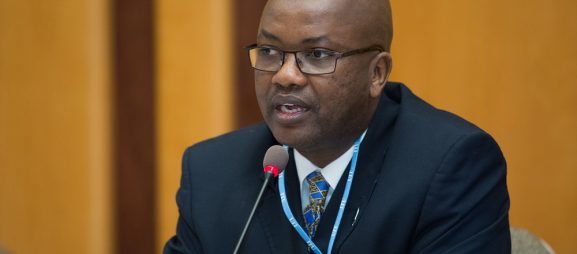
The African Civil Society Society for the Information Society (SCASI or ACSIS) has a new executive office since 03 November 2016. It is chaired by Senegalese Cissé Kane (photo) Interim for some years. He was elected by acclamation as the only candidate for this post. He will be assisted during the next four years by Nigerian Remmy NWEKE as vice-president.
The vote was held online for two days and the 175 members on the ACSIS mailing list were asked to vote for two posts, namely the Vice-President and the Treasurer. Like the post of the president, the other candidates for regional coordinator positions in the five regions of Africa did not have challengers. They were elected ex officio.
The electoral process was completed and resulted in the election of the new executive board with a participation rate of 45%. Opportunity for the new president to thank all the members of the SCASI and especially those who conducted the electoral process. The minutes of the GA must now be produced and the new office should enter into force on 18 November 2016.
"Thank you from the bottom of our hearts to everyone for congratulations and for the trust you have expressed unanimously in the new elected Executive Bureau of our organization for the period 2016-2020. Congratulations to the new management team of the SCASI! Thanks to Abdoulaye, Abdou Beukeu, B55, Delphine, Mawaki, Wodjo, for having all together led the electoral process brilliantly and safely! I am very proud of you and belong to this family of SCASI! Thank you to all the candidates for their pan-African spirit and for the fraternity they expressed! I pray to God in his omniscience and generosity to inspire us and guide us together to bring Africa up through the SCASI, "said Cisse to the members of the SCASI.
In June 2003, on the occasion of the 1st World Summit on the Information Society (WSIS) in Geneva, the pan-African network ACSIS was launched with a view to promoting an inclusive and inclusive Information Society in Africa . He was recognized by the Senegalese government in 2008 and has been a member of the International Telecommunication Union (ITU) since 2010.
ACSIS participates in all national and international consultations on ICT and development in Africa and in the world. These include meetings of IGF, AfIGF, WSIS Forum, FSN, ICANN, IANA Transition and AFRALO. ACSIS also supports the creation of national and regional IGFs, the establishment of information, training and awareness-raising workshops on ICT issues.
Comments
Post a Comment